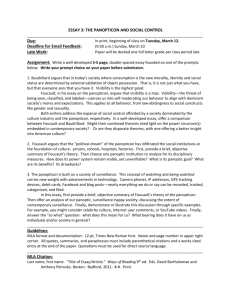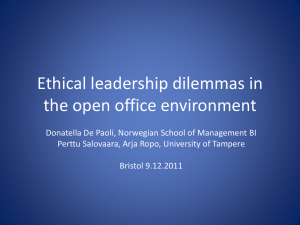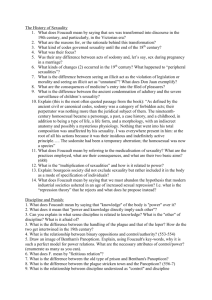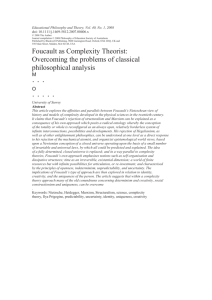Assignment 3 Revision
advertisement
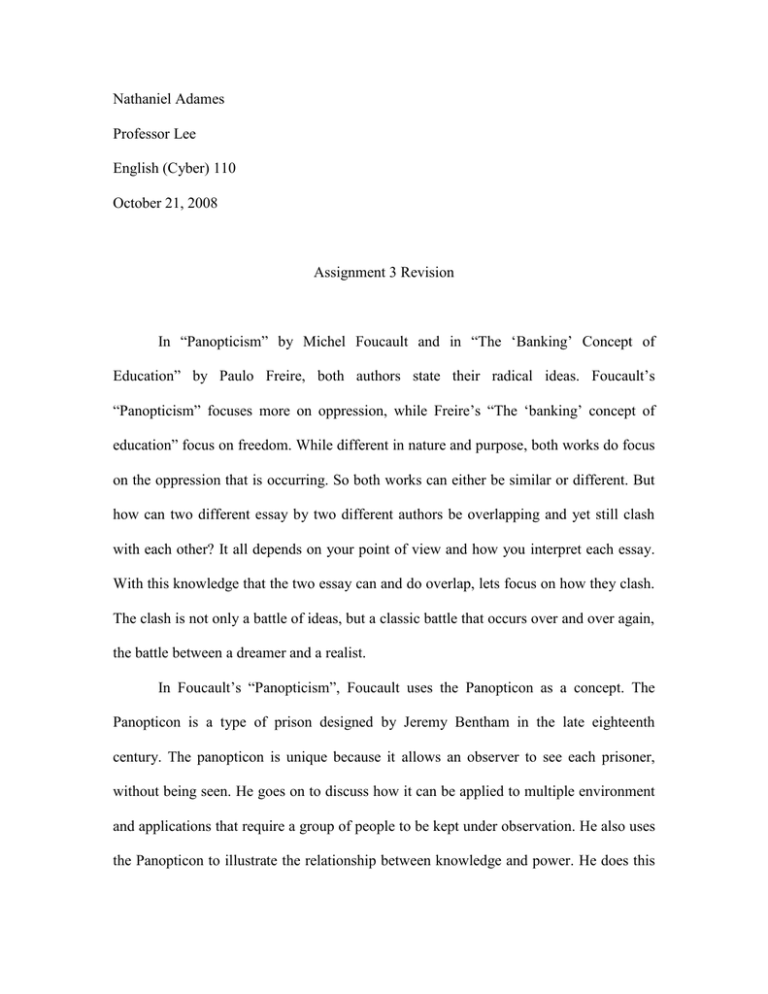
Nathaniel Adames Professor Lee English (Cyber) 110 October 21, 2008 Assignment 3 Revision In “Panopticism” by Michel Foucault and in “The ‘Banking’ Concept of Education” by Paulo Freire, both authors state their radical ideas. Foucault’s “Panopticism” focuses more on oppression, while Freire’s “The ‘banking’ concept of education” focus on freedom. While different in nature and purpose, both works do focus on the oppression that is occurring. So both works can either be similar or different. But how can two different essay by two different authors be overlapping and yet still clash with each other? It all depends on your point of view and how you interpret each essay. With this knowledge that the two essay can and do overlap, lets focus on how they clash. The clash is not only a battle of ideas, but a classic battle that occurs over and over again, the battle between a dreamer and a realist. In Foucault’s “Panopticism”, Foucault uses the Panopticon as a concept. The Panopticon is a type of prison designed by Jeremy Bentham in the late eighteenth century. The panopticon is unique because it allows an observer to see each prisoner, without being seen. He goes on to discuss how it can be applied to multiple environment and applications that require a group of people to be kept under observation. He also uses the Panopticon to illustrate the relationship between knowledge and power. He does this by showing how knowledge leads to power. In this case knowledge doesn’t refer to what you know, but the understanding of how things “work” and are. He conclude his essay by saying how surprising it is that “factories, school, barracks, hospitals” resemble a Panopticon, a prison (Foucault 236). In Freire’s “The ‘Banking’ Concept of Education”, Freire start off by emphasizing how strongly he disapprove of the modern style of education, which he calls the ‘banking’ concept of education. The ‘Banking’ concept of education is the idea that students are to absorb the knowledge deposit by their teacher; students are force to memorize this knowledge. Freire solution for the ‘Banking’ concept is the ‘Problem Posing’ concept of education. As I understand, the ‘Problem Posing’ concept is the idea that the teacher and the students supposed to communicate with each other to answer a question or questions; in this way both students and teacher learn from each other. Freire believe that the banking concept is oppressive because it prevents students from thinking for themselves. Accounting to Foucault, a school or any other educational institution can be a panopticon, a prison; This is because “Whenever one is dealing with a multiplicity of individuals on whom task or a particular form of behavior must be imposed, the panoptic schema may be used” (Foucault 220). As we all know, a prison is design to effectively oppress the inmates and strip then of their power. Freire believes that because of this oppression, that there should be a revolution to stop it. Foucault may agree with him, but will argue that if all schools are Panopticon, then a revolution can not occur. A revolution is not likely to occur because the Panopticon “makes it possible to perfect the exercise of power” (Foucault 220). Panopticon efficiency allows the flawless exercise of power, the power that allows one to exercise control upon another. The Panopticon allow the person in power to see and know all, while the person under his power to see and know little. This in itself is a form of oppression, a form of oppression that can’t be overcome without the person in power allowing it. This form of oppression is also a perfect form of control being because the person being controlled is always being control even if no one is actually maintaining it. This perfect control is perfect discipline, and perfect discipline is perfect power. To put it simple, control is a form of discipline and discipline is a form of power. Works Cited Foucault, Michel. “Panopticism.” ways of reading. Ed. David Bartholomae and Anthony Petrosky. 209 – 37. Print. Freire, Paulo. “The ‘Banking’ Concept of Education.” ways of reading. Ed. David Bartholomae and Anthony Petrosky. 243 – 57. Print.
